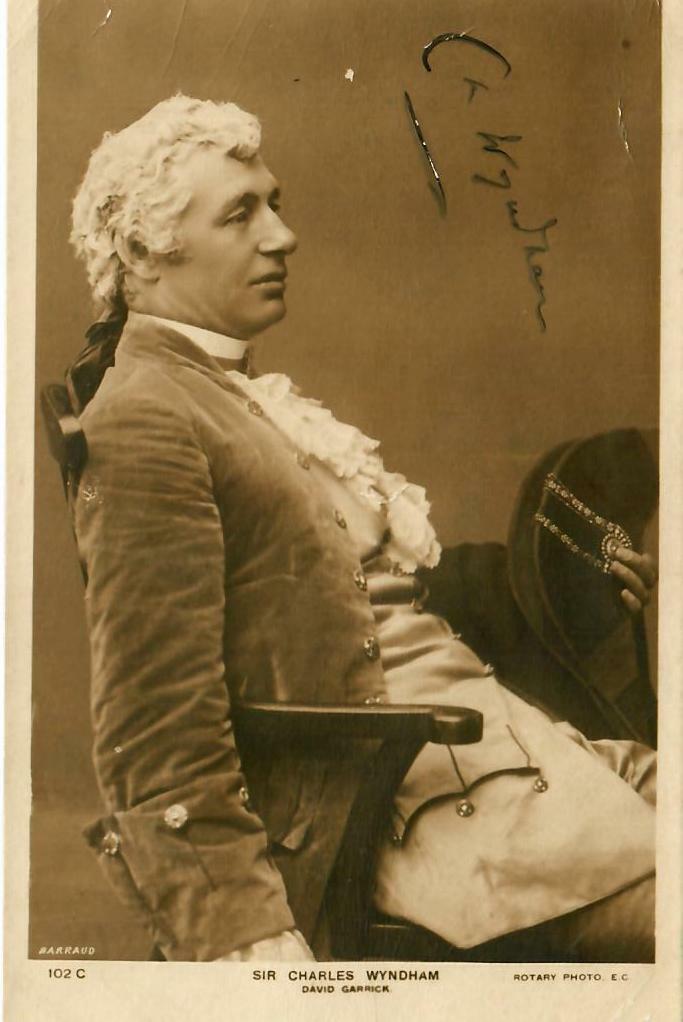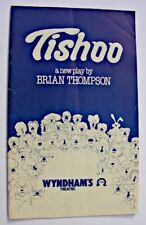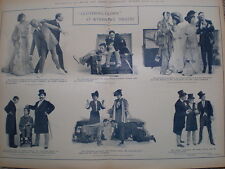 On eBay Now...
On eBay Now...\"Wyndham\'s Theatre\" Charles Wyndham Signed Postcard For Sale

When you click on links to various merchants on this site and make a purchase, this can result in this site earning a commission. Affiliate programs and affiliations include, but are not limited to, the eBay Partner Network.
\"Wyndham\'s Theatre\" Charles Wyndham Signed Postcard:
$104.99
Up for sale "Wyndham's Theatre" Charles Wyndham Hand Signed Postcard.
ES-1215
Sir Charles Wyndham (23 March 1837 – 12 January 1919), né Charles Culverwell, was an English actor and theatre proprietor. Wyndham's Theatre in London is named after him, and he also built the New Theatre (now the Noël Coward Theatre) nearby. Wyndham's family intended him for a medical career, and he studied medicine while enthusiastically engaging in amateur theatricals in his spare time. Torn between medicine and the stage, he spent three years in the US as a surgeon in the Union army in the American Civil War and on two occasions acted unsuccessfully on the New York stage. After returning to Britain and establishing himself as an actor he made further trips to the US between 1882 and 1910, playing in theatres all around the country. In London, Wyndham became known for his comic skills, both in light comedy and farce. He took over the management of the Criterion Theatre in 1876 and remained in charge there for more than 20 years. "Criterion farce" became a familiar feature of the West End theatre, usually risqué French pieces toned down to avoid shocking the Victorian British audience. Later, Wyndham was known for his appearances in period costume dramas, most of all T. W. Robertson's David Garrick, which he revived frequently. Among the authors who wrote for him were W. S. Gilbert, F. C. Burnand and Henry Arthur Jones. Oscar Wilde wrote The Importance of Being Earnest with Wyndham in mind, but circumstances prevented him from playing in it. Wyndham commissioned two London theatres, both designed by W. G. R. Sprague: Wyndham's, opened in 1899, and the New, which opened four years later. He retired in 1913, and died at his London house in 1919, aged 81. Wyndham was born in Liverpool on 23 March 1837, the second son of Major Richard Culverwell (c. 1820–1860) and his wife, Mary Ann. He had one brother, who did not survive childhood, and three sisters. Biographies published in Wyndham's lifetime state that Culverwell was a doctor, but in the Oxford Dictionary of National Biography (2011) Michael Read writes:His father's first name suggested military rank, but Major Culverwell had no connection with the army: he and his son claimed for him the profession of physician, but he does not appear to have possessed a British medical qualification, and in the directories he was variously described as watchmaker, hotelier, and victualler. The truth is in doubt. Wyndham went to boarding-schools in England, Scotland, Germany and France. In Scotland he acquired the taste for amateur theatricals, and in Paris he frequented the Comédie-Française and the Théâtre du Palais-Royal. The former was known for its classical style and the latter had a long tradition of farce; both were a formative influence on his acting. He studied medicine at King's College, London, and at the College of Surgeons and the Peter Street Anatomical School in Dublin, and despite the counter-attractions of amateur acting and theatre-going he qualified as MRCS in 1857 and took his Doctor of Medicine degree at the University of Giessen in 1859. In 1860 he married Emma Silberrad (c. 1837–1916), a member of a German family that was both aristocratic and affluent. Read comments, "By marrying into this house of merchant princes Wyndham was spared the fear of destitution that plagued other actors". In February 1862 Wyndham, who had by then adopted his stage surname, made his professional debut at the Royalty Theatre as the juvenile lead opposite the young, but already experienced, Ellen Terry. Her acting was praised; his was not. At the time, it was the practice of some London theatre managers to engage amateurs to appear in prominent roles in otherwise professional companies, and The Examiner took Wyndham for such an amateur. He remained in the Royalty's company for six months, and after his inauspicious debut he began to attract excellent reviews. In the farce Grandfather Whitehead he won praise from the theatrical newspaper The Era, which found him "a very promising Light Comedian" and his playing "as easy, natural and perfect as it need be" In a later review during the season The Era said: We have before taken occasion to speak favourably of the acting of Mr Charles Wyndham, and almost in every instance in which that gentleman essays a part, he achieves it satisfactorily. He may, in all fairness, be termed a rising Actor, and if he but continues to add care to his admitted ability and acknowledged zeal, he can hardly fail to occupy a notable position. Still undecided between a theatrical and medical career, but too adventurous in spirit to relish the idea of becoming a family doctor, Wyndham travelled to the US later in 1862, determined to become a medical officer in the Union army in the American Civil War. The military authorities hesitated to sign him up, but he successfully persisted and served until the war was nearly over. During breaks from his military service he made two unsuccessful appearances on the stage in New York, first in a company led by John Wilkes Booth (later the assassin of Abraham Lincoln), and then in Mrs John Wood's troupe.
Related Items:"Wyndham's Theatre" Charles Wyndham Signed Postcard
$104.99
TISHOO BRIAN THOMPSON 1979 Wyndham’s Theatre Penelope Wilton Alec McCowen Palmer
$9.44
Theatre photos Glittering Gloria Wyndham's London 1903
$12.58








